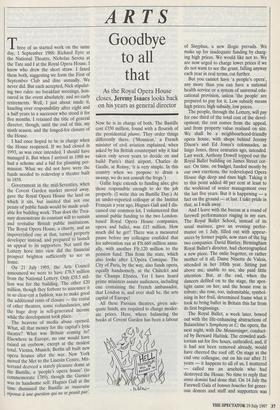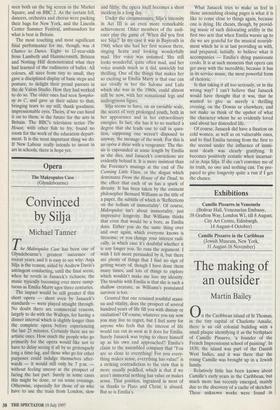ARTS
Goodbye to all that
Three of us started work on the same day, 1 September 1988: Richard Eyre at the National Theatre, Nicholas Serota at the Tate and I at the Royal Opera House. I know who drew the short straw. I faxed them both, suggesting we form the First of September Club and dine annually. We never did. But each accepted, Nick stipulat- ing two rules: no breakfast meetings, hon- oured in the event absolutely, and no early retirements. Well, I just about made it, handing over responsibility after eight and a half years to a successor who stood it for five months. I retained the title of general director, though, until the end of this, my ninth season, and the longed-for closure of the House.
I had once hoped to be in charge when the House reopened. If we had closed in 1993, as was once intended, I should have managed it. But when I arrived in 1988 we had a scheme and a bid for planning per- mission. What we did not have were the funds needed to redevelop a theatre built in 1858.
Government in the mid-Seventies, when the Covent Garden market moved away, gave the Royal Opera House the land on which it sits, but insisted that not one penny of public funds would be made avail- able for building work. Thus does the Trea- sury demonstrate its constant will to sustain and revitalise British public institutions. The Royal Opera House, a charity, and an impoverished one at that, turned property developer instead, and prepared to launch an appeal to its supporters. Not until the Lottery hove into view did the financial prospect brighten sufficiently to see us home. On 21 July 1995, the Arts Council announced we were to have £78.5 million from the National Lottery. Only £58.5 mil- lion was for the building. The other £20 million, though they forbore to announce it in so clear-cut a fashion, was to make good the additional costs of closure — the rental of other theatres, some redundancies, and the huge drop in self-generated income while the development took place. The heavens of media abuse opened. What, all that money for the capital's lyric theatre? What was Britain coming to? Elsewhere in Europe, no one would have raised an eyebrow, except at the modest total. Vienna, Munich, Berlin all built new opera houses after the war. New York moved the Met to the Lincoln Centre. Mit- terrand decreed a stately pleasure dome at the Bastille, a 'people's opera house' (to commemorate 1789), though the Gamier was its handsome self. Hugues Gall at the time dismissed the Bastille as `mauvatse reponse a une question qui ne se posait pas'. Now he is in charge of both. The Bastille cost £350 million, found with a flourish of the presidential plume. They order things differently there. (`Monsieur,' a French minister of civil aviation explained, when asked by his British counterpart why it had taken only seven years to decide on and build Paris's third airport, Charles de Gaulle, at Roissy, 'it is very simple. In this country when we propose to drain a swamp, we do not consult the frogs.') Gallic logic extends to funding also; give those responsible enough to do the job properly. (I write this on Bastille Day.) At an under-reported colloquy at the Institut Frangais a year ago, Hugues Gall and I dis- cussed our common lot. I volunteered that annual public funding to the two London- based Royal Opera House companies, opera and ballet, was £15 million. How much did he get? There was a measured pause before my colleague confided that his subvention ran at Ffr.660 million annu- ally, with another Ffr.120 million to the pension fund. This from the state, which also looks after L'Opera Comique. The City of Paris, by the way, also funds opera, equally handsomely, at the Chatelet and the Champs Elysdes. Yet I have heard prime ministers assure audiences, including one containing the French ambassador, that London is, and ever shall be, the arts capital of Europe!
All these Parisian theatres, given ade- quate funds, are required to charge moder- ate prices. Here, where balancing the books at Covent Garden has been a labour of Sisyphus, a new illogic prevails. We make up for inadequate funding by charg- ing high prices. We would like not to. We are now urged to charge lower prices if we do not want to see the grant, falling anyway each year in real terms, cut further.
But you cannot have 'a people's opera', any more than you can have a national health service or a system of universal edu- cational provision, unless 'the people' are prepared to pay for it. Low subsidy means high prices; high subsidy, low prices.
The people, through the Lottery, will pay for one third of the total cost of the devel- opment; the rest comes from the appeal, and from property value realised on site. We shall be a neighbourhood-friendly opera house, with shops behind Jeremy Dixon's and Ed Jones's colonnades, as Inigo Jones, three centuries ago, intended. Last week, Anthony Dowell topped out the Royal Ballet building on James Street cor- ner. On time, on budget, funded mostly by our own exertions, the redeveloped Opera House digs deep and rises high. Taking it to this point added 40 per cent at least to the workload of senior management over the last five years. But it is happening — a fact on the ground — at last. I take pride in that, as I walk away.
And I leave with the huzzas at a round of farewell performances ringing in my ears. The Royal Ballet School, instead of its usual matinee, gave an evening perfor- mance on 1 July, filled out with appear- ances by former pupils, now stars of the big two companies. David Bintley, Birmingham Royal Ballet's director, had choreographed a new piece. The onlie begetter, or rather mother of it all, Dame Ninette de Valois, attended in her 100th year. Sitting just above me, unable to see, she paid little attention. But, at the end, when the dancers defiled on to the stage, the spot- light came on her, and the house rose in tribute; she rose, too, indomitable, symbol- ising in her frail, determined frame what it took to bring ballet in Britain this far from its first beginnings.
The Royal Ballet, a week later, bowed out with the life-enhancing abstractions of Balanchine's Symphony in C; the opera, the next night, with Die Meistersinger, conduct- ed by Bernard Haitink. The crowded audi- torium sat for five hours, enthralled, and, if it had not been removed already, would have cheered the roof off. On stage at the end one colleague, out on his ear after 31 years — it happens to all of us, I muttered — called me an arsehole who had destroyed the House. No time to reply that anno domini had done that. On 14 July the Farewell Gala of bonnes bouches for gener- ous donors and staff and supporters was seen both on the big screen in the Market Square, and on BBC 2. As the curtain fell, dancers, orchestra and chorus were packing their bags for New York, and the Lincoln Center Summer Festival, ambassadors for what is best in Britain.
The most touching and most significant final performance for me, though, was A Chance to Dance. Eight- to 12-year-olds from Lambeth and Hammersmith, Brixton and Notting Hill demonstrated what they had learned of the rudiments of ballet. All colours, all sizes from tiny to small, they gave a disciplined display of basic steps and posture, to delight their proud parents in the de Valois Studio. How they had worked to do so. The older ones had seen Sympho- ny in C, and gave us their salute to that, bringing tears to my still, thank goodness, impressionable eyes. Theirs, if we can hand it on to them, is the future for the arts in Britain. The BBC's television series The House, with other fish to fry, found no room for the work of the education depart- ment. It is the most important thing we do. If New Labour really intends to invest in art in schools, there is hope yet.



























































 Previous page
Previous page